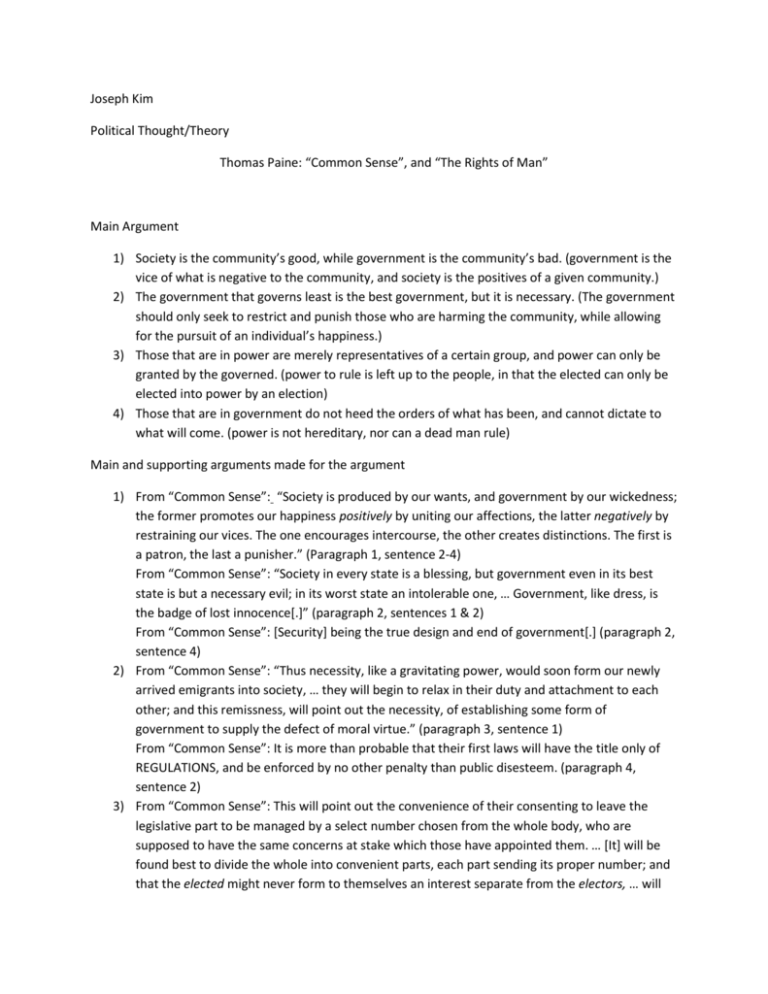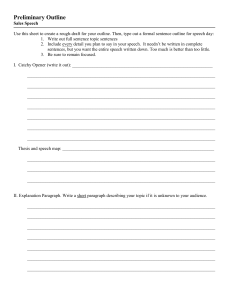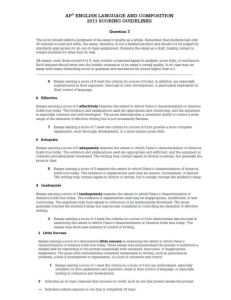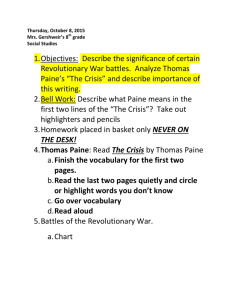Joseph Kim Political Thought/Theory Thomas Paine: “Common
advertisement

Joseph Kim Political Thought/Theory Thomas Paine: “Common Sense”, and “The Rights of Man” Main Argument 1) Society is the community’s good, while government is the community’s bad. (government is the vice of what is negative to the community, and society is the positives of a given community.) 2) The government that governs least is the best government, but it is necessary. (The government should only seek to restrict and punish those who are harming the community, while allowing for the pursuit of an individual’s happiness.) 3) Those that are in power are merely representatives of a certain group, and power can only be granted by the governed. (power to rule is left up to the people, in that the elected can only be elected into power by an election) 4) Those that are in government do not heed the orders of what has been, and cannot dictate to what will come. (power is not hereditary, nor can a dead man rule) Main and supporting arguments made for the argument 1) From “Common Sense”: “Society is produced by our wants, and government by our wickedness; the former promotes our happiness positively by uniting our affections, the latter negatively by restraining our vices. The one encourages intercourse, the other creates distinctions. The first is a patron, the last a punisher.” (Paragraph 1, sentence 2-4) From “Common Sense”: “Society in every state is a blessing, but government even in its best state is but a necessary evil; in its worst state an intolerable one, … Government, like dress, is the badge of lost innocence[.]” (paragraph 2, sentences 1 & 2) From “Common Sense”: [Security] being the true design and end of government[.] (paragraph 2, sentence 4) 2) From “Common Sense”: “Thus necessity, like a gravitating power, would soon form our newly arrived emigrants into society, … they will begin to relax in their duty and attachment to each other; and this remissness, will point out the necessity, of establishing some form of government to supply the defect of moral virtue.” (paragraph 3, sentence 1) From “Common Sense”: It is more than probable that their first laws will have the title only of REGULATIONS, and be enforced by no other penalty than public disesteem. (paragraph 4, sentence 2) 3) From “Common Sense”: This will point out the convenience of their consenting to leave the legislative part to be managed by a select number chosen from the whole body, who are supposed to have the same concerns at stake which those have appointed them. … [It] will be found best to divide the whole into convenient parts, each part sending its proper number; and that the elected might never form to themselves an interest separate from the electors, … will establish a common interest with every part of the community, they will mutually and naturally support each other, and on this depends the strength of government, and the happiness of the governed.” (paragraph 6, sentences 2-5) From “Common Sense”: Here then is the origin and rise of government; namely a mode rendered necessary by the inability of moral virtue to govern the world; … absolute governments have this advantage with them, that they are simple; if the people suffer, the know the head from which their suffering springs, know likewise the remedy, and are not bewildered by a variety of causes and cures.” (paragraphs 7-8) 4) From “Rights of Man”: “The vanity and presumption of governing beyond the grave, is the most ridiculous and insolent of all tyrannies.” (paragraph 1, sentence 2) From “Rights of Man”: “The [government] or the people of 1688, or of any other period, had no more right to dispose of the people of the present day, or to bind or to control them in any shape whatever, than the [government] or the people of the present day have to dispose of, bind, or control those who are to live a hundred or a thousand years hence.” (paragraph 2, sentence 2) From “Rights of Man”: “It is the living, and not the dead, that are to be accommodated. When man ceases to be, his power and his wants cease with him; and having no longer any participation in the concerns of this world, he has no longer any authority in directing who shall be its governors, or how its government shall be organized, or how administered.” (paragraph 3, sentence 2) From “Rights of Man”: “There was a time when kings disposed of their crowns by will upon their death-beds, and consigned the people, like beasts of the field, to whatever successor they appointed. This is now so exploded as scarcely to be remembered, and so monstrous as hardly to be believed.” (paragraph 5, sentences 1-2) From “Rights of Man”: “Those who have quitted the world, and those who are not yet arrived in it, are as remote from each other, as the utmost stretch of moral imagination can conceive. What possible obligation, then, can exist between them; what rule or principle can be laid down, that two nonentities, the one out of existence, and the other not in, and who can never meet in this world, that the one should control the other to the end of time?” (paragraph 5, sentences 12) Assessment of the claim Although I understand Mr. Paine’s ideas, I have some questions that won’t be answered by Mr. Paine himself. Firstly, he claims that society is the good of the people, and government is the necessary evil that puts a vice on the people. What is his view on people and human nature then? Is he saying that we are only good when we’re with a small number of people, or does he mean that we are generally good? Because for that, we don’t need a national government then, just small local communities that don’t need bother with larger scales. Or does he mean that normally we are good, but we tend to have evil tendencies? Doesn’t that mean we need to keep our evils in check? If we have a limited form a government, our evils will allow us to find ways around the government, thus exploiting the government, and that can’t fit into this system of government. Second question: How then, according to Mr. Paine, should we actually address government? Should it stay out of economics, society, and/or anything not related to politics? Or should it have a say in all of them, but not complete authority, just enough to “vice” the people into not doing evil? Thirdly, what about colonies that have started by the exploitation of natives? He gave an example of an isolated emigration, but what if there was an emigration without the resources needed? Would the population decide to stay with the government until it can support itself through trade? What about the occurrences of war? How does Mr. Paine intend to address those that actually have trespassed society’s boundaries? And if we were to pit it against modern society, what about all the social and economic issues that we’re faced with today? Perhaps these questions have already been answered in one form or another. However, although I feel Paine addressed the issues that were present in his times, I cannot find that these ideas transcend time and can be applicable anywhere. Perhaps it is because I have been socialized to accept this modern system, however effective it may be, and when I imagine Paine’s society, I happen to see that it does not last as this system for a long time. I am under the belief with Mr. Paine that humans are self-interest first, but I believe that this is the driving force of all policies implemented, that even if there are a fair representation of the peoples, one group will ultimately seek to expand power, whether consciously or unconsciously by exploiting another, more minor group. Though I have more things I can assess in his articles, I feel that they are redundant to what has already been said. As a conclusion, I can see Mr. Paine’s points of government and ideas, but I am conditioned not to accept that these ideals will benefit society, much less actually work.







